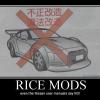R31 with diff whine, how long will it last?
Announcements
-
Similar Content
-
Latest Posts
-
I really dig that skid plate / undertray. Looks like the bumper has a little bit of overhang, so this will be very handy I reckon.
-
So this fella danbelkita is clearly connected to total engines. This is getting quite entertaining though. It's worth losing the $50 sale, thats for sure!!
-
So, they admitted via message that they accidentally sent me a non Hella product. Then, hilariously, out of nowhere I get questioned about the legitimacy of my BMW intercooler for sale. This is the first *ever* enquiry in over 18 months. WIthin 8 mins of me telling "Total Engines" that I'd be reporting them for selling knock off's.
-





Recommended Posts
Create an account or sign in to comment
You need to be a member in order to leave a comment
Create an account
Sign up for a new account in our community. It's easy!
Register a new accountSign in
Already have an account? Sign in here.
Sign In Now